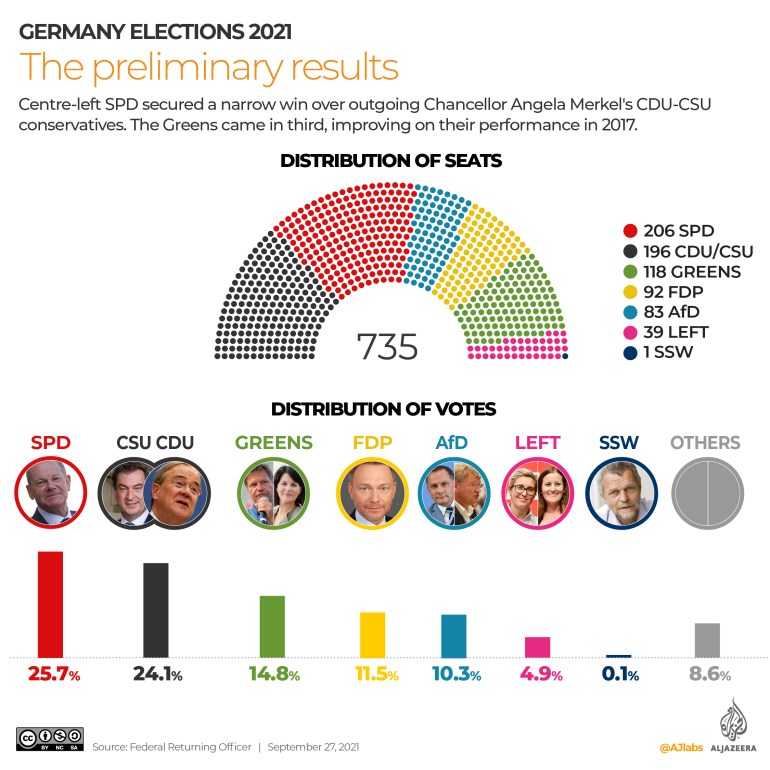A vote for ‘stability’: World reacts to Germany election outcome
European allies welcome performance of pro-EU parties as Russia eyes ‘continuity’ in relations with Berlin.

European powers have welcomed the outcome of Germany’s national election, with France praising the vote as a victory for “stability” and Spain’s Socialist prime minister predicting closer ties following the centre-left Social Democrats (SPD) party’s triumph.
The SPD narrowly led Sunday’s vote, scooping 25.7 percent of the vote, according to provisional results released on Monday.
Keep reading
list of 4 itemsGermany’s centre-left secures narrow win in end-of-era election
Exit polls suggest tight race as voting ends in German election
Germany’s post-Merkel Middle East policy: What to expect
Outgoing Chancellor Angela Merkel’s centre-right CDU-CSU conservative bloc came a close second, but registered their worst-ever performance.
The SPD chancellor candidate, Olaf Scholz, said the party will hold coalition talks with the Greens and the pro-business Free Democratic Party (FDP). The negotiations could take months to conclude.
Scholz, who was finance minister in Merkel’s outgoing “grand coalition” administration, also gave a first indication of his foreign policy ideas.
The 63-year-old told reporters that a government he led would offer the United States continuity in transatlantic relations. He also linked a fuel supply crisis in the United Kingdom to Brexit, signalling solidarity with the bloc.
Here is how other countries have reacted to the developments:
France
France’s European Affairs Minister Clement Beaune praised the outcome of Germany’s vote in Paris’s first official reaction to the poll, welcoming the pro-EU positions held by the SPD, Greens and FDP.
“Here is a country, our close neighbour, that puts great value on moderation, stability and continuity,” Beaune told France 2 television.
“I think that, informally, the talks between German political parties and us should start right now so that we get to know one another,” he added.
Germany, Europe’s largest economy, is France’s closest partner and their relationship lies at the heart of the European Union. President Emmanuel Macron built strong working relations with Merkel.
“I would say that, on a certain level, the Germans have voted for Angela Merkel,” said Beaune, noting that both Scholz and his Christian Democrat rival Armin Laschet had presented themselves in the campaign as the true heir to the outgoing chancellor, who has led Germany for 16 years.
Spain
Spain’s Socialist Prime Minister Pedro Sanchez predicted closer ties between Madrid and Berlin under an SDP-led government.
“Spain and Germany were already very united in our Europeanism and now we have the opportunity to be united in the colour and orientation of our governments,” Sanchez said during a speech in the northern city of Santander.
Sanchez earlier tweeted that Madrid and Berlin would continue to work together for a “stronger Europe” and “fair and green recovery” from the COVID-19 pandemic following the SDP’s win.
Congratulations to @OlafScholz and @spdde for the great results. Spain and Germany will continue to work together for a stronger Europe and for a fair and green recovery that leaves no one behind.
— Pedro Sánchez (@sanchezcastejon) September 26, 2021
EU
European Parliament President David Sassoli, who is also a member of the centre-left political alliance in the EU assembly, congratulated Scholz.
“After this historic crisis, there is no time to lose: Europe needs a strong and reliable partner in Berlin to continue our common work for a social and green recovery,” he tweeted, referring to the COVID-19 pandemic.
Congratulations @OlafScholz and @spdde on your victory! After this historic crisis, there is no time to lose: Europe needs a strong and reliable partner in Berlin to continue our common work for a social and green recovery.
— David Sassoli (@EP_President) September 27, 2021
The EU’s executive held off from commenting, with Brussels waiting until the shape of the government is known before issuing remarks.
Russia
Russia said it hoped for “continuity” in its ties with Germany.
Kremlin spokesman Dmitry Peskov said despite disagreements between Moscow and Berlin, “we are united by an understanding that problems can and should be solved only through dialogue.”
Russian President Vladimir Putin and Merkel, a Russian speaker, have upheld a working relationship while sparring over issues including the Syrian war and Moscow’s alleged involvement in the poisoning of Kremlin critic Alexey Navalny.
Russia and Germany are important trading partners and have worked together to complete the Nord Stream 2 pipeline in the face of objections from Germany’s eastern EU and NATO allies like Poland, the Baltic states and the US, which say it gives Moscow too much control over Europe’s energy supply.
The pipeline will also divert supplies from an existing route through Ukraine and Kyiv fears it will lose much-needed transit fees.
Scholz said on Monday that Moscow had promised that the pipeline will not serve as an energy weapon.
Moscow guaranteed, he said, that “Ukraine will remain a transit country and that we will ensure that gas supplies to certain countries in Eastern Europe are not threatened by Russia.”
Hungary
Hungarian Foreign Minister Peter Szijjarto said that Budapest was ready to work with a new German government and enhance cooperation with Berlin post-election.